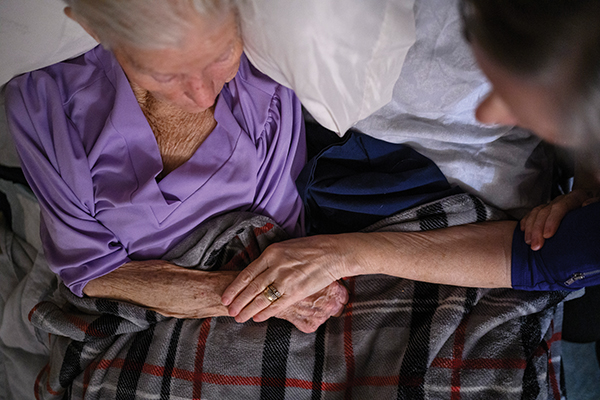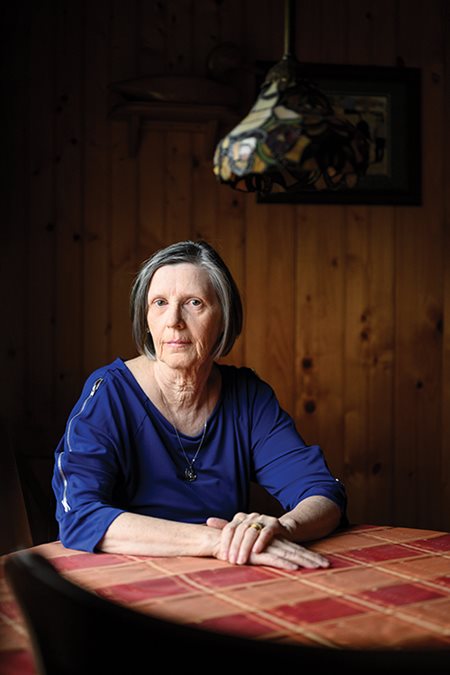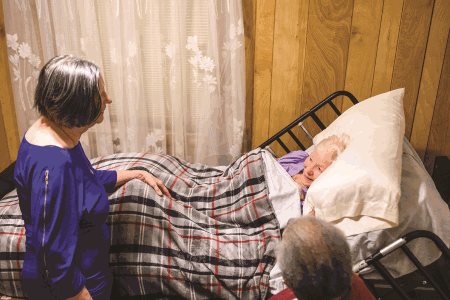
This year, we are publishing several print and digital articles about caregivers, each with different backgrounds and the challenges they face. This is one of those stories.
ERIKA CLOUGH
Department of Maryland, Unit 70
67 years old
Caregiver for her aunt, Elisabeth
“It takes you down dark roads,” American Legion Auxiliary member Erika Clough said about caregiving. “I told my husband one time, ‘I have gone down this path so deep, I want you to take the gun out of the safe. I’m telling you: Hide it from me. I can’t do this.’ He took the gun out and hid it.”
Clough and her sister were raised by their aunt and uncle since about the third grade. Her aunt is originally from Germany.
“We bounced around with my mom, and our aunt and uncle said it wasn’t a stable home,” Clough recalled. “We said we wanted to live with our aunt and uncle. [My aunt] is like my mom to me.”
About eight years ago, their uncle passed away and Clough began to keep an extra eye on her aunt, Elisabeth. For the first five years, she did very well on her own. But then Clough began noticing bruises on Elisabeth’s arms and head and wondered how she was getting them. Elisabeth said she was running into things, but Clough knew her aunt’s house was always kept immaculate, so that didn’t make sense.
She mentioned it to Elisabeth’s doctor, who suggested she might be falling. While walking, she was tending to lean to the left. Her doctor said she should no longer live by herself.
Initially, Clough’s sister had suggested a nursing home would be a good fit.
 “She saved me as a child,” Clough said of her aunt. “I couldn’t do that to her. I feel obligated to care for her.”
“She saved me as a child,” Clough said of her aunt. “I couldn’t do that to her. I feel obligated to care for her.”
About three years ago, Clough and her husband moved Elisabeth into their home.
“The first four months, it was beautiful, wonderful,” Clough recalled. “I could keep my eye on her, and I didn’t see anything wrong.”
Then, Elisabeth had a stroke. Clough started to wonder if she had been having strokes previously. After, she continued to have more strokes, along with seizures.
Then the pandemic hit, plus incidents with her aunt escalated.
“We found her one day in front of the front door, all bloodied up,” Clough said. “She was trying to catch the bus or the train. We had to put motion detectors in our home so we would know if she was on the move in the middle of the night.”
Caregiving took a mental toll on Clough, especially that first year.
Realizing she couldn’t do it all as a caregiver 24/7, Clough needed to ask for help so she could take breaks too — and that’s when a hired caregiver came in to help Monday to Friday, four hours a day.
“[During that time], I run to the store, or I sit in the living room and not have to worry about her,” Clough said.
It is that precious time she gets to herself.
She has also joined a Facebook group of other caregivers.
“I found out quickly I’m not the only one,” she said. “Other people are struggling. Reading between the lines of Alzheimer’s and dementia Facebook groups, [the stories] sound so familiar — ‘I hate my life, but I love my mother/father.’”
She reads about others’ problems in the group and offers advice. Some advice she has shared included getting motion sensors, putting an alarm in your bedroom as the caregiver, and alarms on all doors, just to name a few.
 Elisabeth is currently on hospice. Some days, it seems she isn’t going to make it, Clough said, and then she peaks back to normal. Other days, Elisabeth sleeps for 20 hours.
Elisabeth is currently on hospice. Some days, it seems she isn’t going to make it, Clough said, and then she peaks back to normal. Other days, Elisabeth sleeps for 20 hours.
“It’s an up and down anxiety,” Clough said. “Every morning, I walk in and turn on the light and I’m not sure what I will find. I’m the one who checks on her the most. I am afraid I will find her dead in that bed.”
Clough is often in her aunt’s room now that she is bedridden, holding her hand and singing to her.
“She says, ‘You sound like you’re underwater,’” Clough laughed. “She smiles when I sing.”
For others who may someday be caregivers, Clough offers advice.
“My biggest advice, which I failed to do the first year, was take care of yourself,” she said. “You are so busy worrying about them and their needs that you tend to forget about you. Took me a year to figure that out. I started to fall apart and cry and go into that dark and deep place and I needed to get some help. I’m not superwoman.”
Caregiving is no easy feat, but Clough said keeping her aunt close so she can have family around her every day was worth it.
“When the end comes and I find her that morning, I will tell myself I have done everything I could possibly do,” Clough said. “I have no regrets. I’m going to be OK.”
By Sara Fowler, Staff Writer
Are You A Caregiver?
The people who take care of us — Mom, Dad, grandparents, siblings, spouses, and visiting nurses — they get us where we need to be, they make sure we receive our medicine, and they always know how to make us feel loved. Caregivers do so much, yet oftentimes, these heroes don’t realize it. Are you currently serving in a caregiver role? We’d love to talk to you! Email us at ALAMagazine@ALAforVeterans.org.
(Caregiver photos by Matt Roth).
In the spirit of Service, Not Self, the mission of the American Legion Auxiliary is to support The American Legion and to honor the sacrifice of those who serve by enhancing the lives of our veterans, military, and their families, both at home and abroad. For God and Country, we advocate for veterans, educate our citizens, mentor youth, and promote patriotism, good citizenship, peace and security.